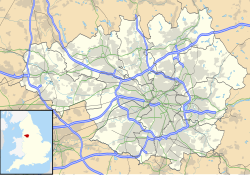All Saints' Church, Stand
| All Saints' Church, Whitefield | |
|---|---|

West end
|
|
| Coordinates: 53°33′00″N 2°17′55″W / 53.5501°N 2.2986°W | |
| OS grid reference | SD 803 060 |
| Location | Church Lane, Stand, Whitefield, Greater Manchester |
| Country | England |
| Denomination | Anglican |
| Website | www |
| Architecture | |
| Status | Parish church |
| Functional status | Active |
| Heritage designation | Grade I |
| Designated | 15 August 1966 |
| Architect(s) | Charles Barry |
| Architectural type | Church |
| Style | Gothic Revival |
| Groundbreaking | 1821 |
| Completed | 1826 |
| Construction cost | £13,729 |
| Specifications | |
| Materials | Millstone grit |
| Administration | |
| Parish | All Saints, Stand |
| Deanery | Radcliffe and Prestwich |
| Archdeaconry | Bolton |
| Diocese | Manchester |
| Province | York |
| Clergy | |
| Rector | Revd Canon Alison J Hardy |
| Assistant priest(s) | Revd Catherine D Binns |
| Laity | |
| Organist/Director of music | Richard Fairclough |
| Churchwarden(s) | Mandi Davies, Ann Smith |
All Saints' Church or Stand Church is an active Anglican parish church in Stand, Whitefield, Greater Manchester, England. It is in the deanery of Radcliffe and Prestwich, the archdeaconry of Bolton, and the diocese of Manchester. The church is recorded in the National Heritage List for England as a designated Grade I-listed building. It was a Commissioners' church, having received a grant towards its construction from the Church Building Commission. The church is a tall building, standing on high ground, and is constructed on a platform.
Built between 1821 and 1826, All Saints' Church is one of the many Commissioners' churches built to celebrate the defeat of Napoleon at the Battle of Waterloo in 1815. The land on which the church and vicarage were built was given to the parish by the Earl of Derby. The architect Sir John Soane was invited to design the church to accommodate about 1,800 people, and to cost no more than £12,000. He declined and passed the commission to Charles Barry. This church was Barry's first commission. Its design was similar to his design for St Matthew, Campfield. Manchester (which has since been demolished); differing in being provided with a tower, rather than a spire. A grant of £13,812 (equivalent to £1,050,000 as of 2015) was given towards its construction by the Church Building Commission. The foundation stone was laid on 3 August 1821, and the church was consecrated by the Bishop of Chester on 8 September 1826.
All Saints is constructed in millstone grit from the Pennines. The architectural style is described as "fanciful" Gothic. The plan of the church is rectangular in five bays, with a canted apse at the east end, and a west porch and tower. The lowest stage of the tower forms the porch, which is entered through tall narrow pointed arches. The bell openings are pairs of lancets. Along the sides of the church are two tiers of windows. The tower and the body of the church have embattled parapets and crocketed pinnacles.
...
Wikipedia

